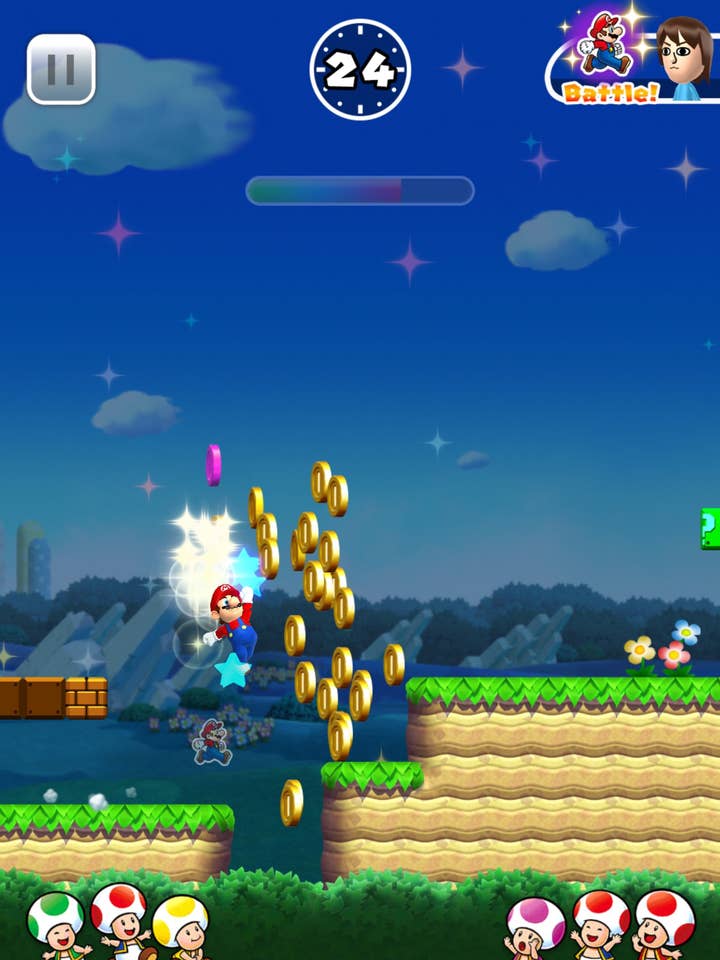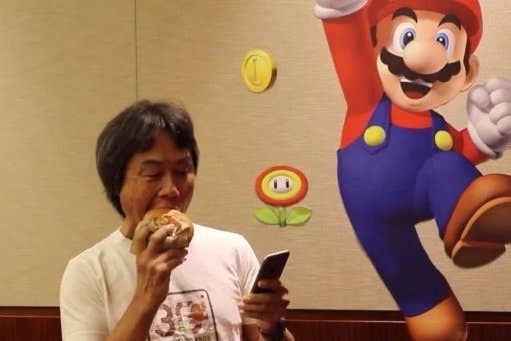Nintendo raises the banner for premium mobile gaming
A latecomer to a battle that was lost some time ago, Nintendo is choosing to champion premium games on mobile over the ubiquitous F2P model
For those who have been following the games industry closely over the past decade or so, watching Shigeru Miyamoto take the stage at Apple's iPhone 7 event in California last week felt like a cheese-induced fever dream. Of course, we've all known for some time that Nintendo's stance on mobile gaming had softened to the point that a long-term partnership with DeNA and the phenomenal launch of Pokemon Go had become possible. Seeing Miyamoto announce what will likely be one of the company's most important launches of the year on Apple's stage, though, took Nintendo's new approach to mobile out of the realm of abstract knowledge and into the realm of concrete reality.
Plenty of analysts and commentators have, of course, argued for Nintendo's engagement with mobile games for years. What is very clear from the announcement of Super Mario Run, though, is that Nintendo is still utterly determined to do mobile on its own terms and nobody else's. I've written before about how Nintendo sees mobile as a complementary business to console gaming - with mobile titles using established, well-loved console IP to drive their success, and in turn drumming up interest in subsequent console games through their broad reach and accessibility. Where much commentary has focused on mobile as a threat to console, Nintendo sees the potential for a virtuous circle. In order to realise that, however, Nintendo has apparently decided to take on a herculean task; Nintendo wants to change how the world consumes mobile games.
"If almost any other company did this, I would probably dismiss it out of hand as naive and doomed to failure... Nintendo is turning up fully armoured and equipped to a battle that was already lost long ago"
There were lots of things about Miyamoto's appearance at the Apple keynote that were interesting, from the overt statement made by Nintendo's most famous creator turning up on Tim Cook's stage to the still-unclear nature of the iOS exclusivity for Mario's mobile debut. Perhaps the most interesting thing, though, is that Nintendo has chosen to eschew the well-established free-to-play models used almost universally in the mobile space. We don't know exact details of the game's business model yet, but Miyamoto was adamant about his desire to avoid the microtransaction models that have become the foundation of mobile gaming. Instead, some kind of up-front payment - perhaps not at the point of purchase, but early in the user experience - seems to be planned.
If almost any other company did this, I would probably dismiss it out of hand as naive and doomed to failure. Whatever your personal feelings on free-to-play may be - and there are undoubtedly lots of bad, abusive F2P games out there which have led to a lot of people feeling justifiably "burned" by the model - it's effectively the only model that works on mobile. Right now there is a market for one premium game on mobile devices, and that's Minecraft. Everything else that tries to put a price tag on itself in Apple's App Store or Google's Play Store sinks without a trace. In the early years of the App Store developers regularly lamented the "race to the bottom" in mobile game pricing, and waged several doomed (and often ill-conceived from the outset) efforts to revive premium games on mobile devices; more recently, such efforts have become rare. Nintendo is turning up fully armoured and equipped to a battle that was already lost long ago.
Of course, none of the developers who tried to fight against the tide of F2P was Nintendo, none of them was using the most recognisable franchise in videogame history, and none of them was Shigeru Miyamoto. All of those things are important. Super Mario Run has an instant head-start on any other premium app out there; assuming it's "free to start" (the distinction the company has made between its planned offerings and existing free-to-play games), it's going to get tens if not hundreds of millions of downloads as soon as it launches. That will be assisted significantly by another very important factor that sets Nintendo's effort apart from those that have gone before; Apple's support. In the past, Apple has not always been enthusiastic about supporting premium games on its platform; now, it's taken the unprecedented step of adding the unreleased Super Mario Run to the App Store in advance, with the download button replaced with a "Notify" button. Apple's clout, in terms of placement in the App Store, is likely more valuable than any marketing campaign a publisher could hope to pay for.

The billion-dollar question, though, is whether all of this will be enough to turn back the tide - or whether Miyamoto is just a latter day Canute. Even for a company with Nintendo's clout and Apple's backing, it's hard to escape the fact that the assumption of F2P is deeply rooted with mobile consumers, who have, for all the protestations of a vocal minority, harshly rejected almost every game that has attempted to charge a premium price instead. Commentators talking critically about the rise of F2P tend to highlight specific policies or decisions that contributed to its dominance, including Apple's tendency to highlight free games rather than paid ones as a consequence of its early view of the App Store as little more than a value-add for iPhone hardware sales. Others tend to "blame" consumers for being unwilling to pay for premium games, which is little more than an exercise in futility and self-importance.
The reality is that the rise of F2P was likely inevitable; while Apple's policies, and later Google's, did help to boost the model, nothing short of an outright ban on microtransactions would have stopped F2P from becoming dominant on mobile. Absent of impediments to the functioning of the market, distribution costs (i.e. the cost of creating and distributing a copy of something) tending towards zero will be followed rapidly by prices tending towards zero, and a different monetisation model will emerge. If you create a good game and put a premium price tag on it, no matter how low, you have left open a space below you in which a competitor with an equally good game can undercut you. As long as there's some other way to make money (advertising, F2P, sponsorship, whatever), it's inevitable that eventually everyone will be pricing even the best of games at zero.
"This is, in many ways, the last stand for premium mobile gaming. The danger is that Nintendo burns through its IP library rapidly, builds no sustainable businesses and then finds its mobile returns tumbling with each subsequent game"
What Nintendo is battling, then, isn't just a trend or a fad in mobile; it's economic logic itself. Yet that's not a reason to write off what the company is trying to do. For a start, there's a different kind of economic logic at work for Nintendo; the company fears that an F2P Mario game would risk the value of its IP, and would rather take the gamble of launching a Mario game that's non-F2P and doesn't perform well commercially (a risk which has a medium likelihood of coming to pass but minimal consequences), than the gamble of launching an F2P Mario game and having it viewed as exploitative and damaging (perhaps a lower likelihood of coming to pass, but catastrophic consequences for Nintendo's biggest asset). For another thing, Nintendo is arguably the only company in the world in a position to actually make this work. If there is to be a premium tier for games on mobile devices, it will have to be held aloft on the back of very famous franchises and creators, whose reputation and recognition will counterbalance the economic pressure that otherwise pushes prices towards zero. In other words, consumers who don't feel that they have to pay for games in general must find some value in the act of paying for a Nintendo game.
Creating that "premium" tier of mobile games, if Nintendo can actually pull off such a miracle for the medium to long term, might be the most lucrative thing the company has ever done. As it stands, it's pretty much inevitable that the firm's early mobile titles will be successful simply off the back of the interest which surrounds them. Nintendo's fame and Apple's support mean that the games will be downloaded so much that even a very modest conversion rate will ensure financial success. Consider that Pokemon Go has been downloaded over 500 million times to date; if Super Mario Run achieves similar stats and only 1% of its users decide to pay for the full game, it will have "outsold" (though not outgrossed, of course) the Wii U Mario titles, off the back of vastly lower development costs. Only a small uptick in that conversion rate could even make Super Mario Run into one of the top-grossing Mario games of all time.
That's a magic trick, though, that can't be repeated indefinitely. The top-grossing mobile games generally continue making money for years and years, thanks to allowing regular players to continue paying into the game. Nintendo's model for Super Mario Run seemingly ensures that the game's revenues will fade out much more rapidly - and it will be very difficult to avoid diminishing returns with subsequent Mario games, since you'll never recapture the storm of interest of Mario's first mobile outing with his second.
This is, in many ways, the last stand for premium mobile gaming. The danger is that Nintendo burns through its IP library rapidly, builds no sustainable businesses and then finds its mobile returns tumbling with each subsequent game. Should that come to pass, even the Kyoto giant may have to bow to the inevitability of F2P; but if Nintendo can pull this off, it may open the doors for far more varied business models for everyone in mobile gaming.

